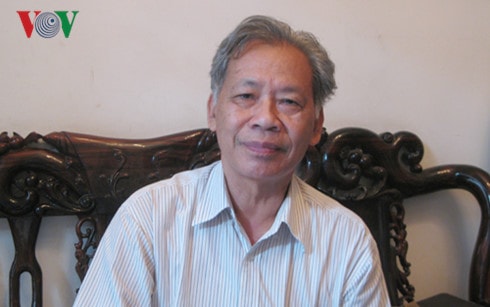Abuse of power creates 'first descendants, second money'
Mr. Thang Van Phuc, former Deputy Minister of the Ministry of Home Affairs, said that it was the abuse of power that gave birth to the recruitment style of "first descendants, second money, third relationships".
Regarding this issue, VOV.VN reporter interviewed Mr. Thang Van Phuc, former Deputy Minister of Home Affairs.
 |
| Former Deputy Minister of Home Affairs Thang Van Phuc. |
Mr. Thang Van Phuc:The 2008 Law on Cadres and Civil Servants stipulates things that cannot be done in cadre work, such as the head and deputy head of an agency cannot arrange for their spouse, children, relatives, etc. to hold positions in personnel organization, finance-accounting, etc. The laws and policies of the Party and the State have clearly stipulated this, but some responsible agencies or management agencies at higher levels have not been able to control it, leading to the situation where relatives of the head and deputy head of an agency are allowed to hold positions in the agency where they are working. Reporter: What is your comment on the story of the Director of the Tax Department of Ba Ria-Vung Tau province planning for his wife to hold the position of Deputy Director of the Tax Department of his home province?
From a certain perspective, if it is not within the scope of the law, it is normal. There was even a long time when we encouraged “father to son”. However, our policy and law do not stipulate this.
To control the promotion and appointment of relatives, which is monitored and criticized positively and effectively by the people and social organizations, many cases as reported by the press and public opinion will not slip through the cracks. The main fault here is the inspection and control work as well as the reporting regimes of agencies at all levels responsible for personnel work.
We have a system of human resource management agencies such as the Central Organizing Committee, the Ministry of Home Affairs... if we look at it as a whole, the entire system ensures quite tight human resource work.
However, in reality, there are negative manifestations or people have taken advantage of loopholes in this work. If a locality or an agency lacks democracy, has authoritarian leadership, and does not comply with regulations on personnel work, it is easy for relatives and family members to be in positions that are not in accordance with the law.
PV: Do you think that this situation is due to limitations in training of source cadres as well as the supervision of some cadres who have been given power?
Mr. Thang Van Phuc: We have clearly stipulated that every year, the agency using cadres must develop a plan for recruitment, appointment, and promotion of cadres, report to the management agency for approval and organize implementation according to regulations. However, for a long time, this has not been done strictly, is not standardized and has many loopholes, so people can take advantage of and "evade" the law. Therefore, it is necessary to conduct a review and inspection to detect unreasonable things, and make timely adjustments.
Socially, public opinion does not easily accept that state agencies have wives, husbands, children, and even many relatives working together, no different from family agencies. Leaders themselves must review and adjust this and must also be exemplary in compliance.
Implementing new personnel regimes in the form of competitive entrance exams for civil servant positions will limit the current negative aspects. It is also clear that when internal struggles are not good, leaders violate democracy, violate procedures or abuse power in personnel work, which can easily lead to the consequences as seen. Since most of the cadres and civil servants in agencies are party members, it cannot be said that they do not know about this. The problem is that internal struggles are not good, and out of respect, they tend to flatter each other.
If we do not have the tools and means to control power and limit risks, gradually government agencies, state organizations, corporations, and general companies with state capital will become clan and family corporations... Therefore, the root of the problem is the sense of responsibility in performing the duties of the agency's head; secondly, their exemplary compliance with the law in implementation; thirdly, their adherence to democratic principles in personnel work.
In the period 2001-2010, there were leadership and management exams in Da Nang, Long An, Ho Chi Minh City, and later in Quang Ninh, the Ministry of Transport, the Ministry of Justice... which created a new atmosphere. Through fair competitive exams for appointment as well as implementing strict regimes in training, entrance exams, promotion exams... to select a good team of cadres.
How to overcome the situation of “children of the powerful”? Regulations in implementing the meritocracy are the trend we are following. That is, from the initial recruitment of civil servants to rank promotion, promotion, and appointment, all must follow the regulations of competitive examinations in a public and transparent manner.
Each position and title must have specific standards. It is necessary to review all regulations and urgently build a modern, professional, open and transparent civil service and public service regime to overcome the loopholes in personnel work. Only then can we truly choose the right talent, the person with the right qualifications, capacity and qualities for a leadership or management position.
I think that cadres are the ones responsible for the operation of the entire apparatus. We spend a lot of effort to make laws, policies and regulations, but the ones who strictly and responsibly implement them are cadres at all levels. We must go to the core of our cadre system, find our "loopholes" and weaknesses, and from there, increase our attention to this area. Only then will we be able to carry out the new functions and tasks of the state apparatus, and the development and integration goals of the country.
As Uncle Ho once said: to build socialism, there must be socialist people. In this period of international integration and market economy, this administrative and public service system must serve the people and serve development. These requirements require a team of appropriate civil servants.
I am very pleased with the determination of Prime Minister Nguyen Xuan Phuc and the new Government to build a Government that is creative, constructive, honest, active and serves the people. That requires new standards to create new vitality for a civil service that serves the people, serves businesses and serves development.
PV: To increase the responsibility of leaders, do you think there should be sanctions if leaders do not set an example and allow mistakes in management to occur?
Mr. Thang Van Phuc: That is correct. The law stipulates that if a civil servant fails to fulfill his/her duties for two consecutive years, the competent agency, organization or unit will terminate his/her employment. We must strictly comply with that. Civil servants, from specialists, senior specialists to senior specialists, must have an annual assessment system to encourage civil servants to be conscious in performing their duties. At the same time, civil servants themselves must be conscious of self-study and improving their qualifications. When meeting all the requirements, cadres and civil servants can maintain their positions or be promoted.
Reporter: The recent public outcry regarding some ministries and sectors is probably due to some officials not being exemplary and impartial in promoting, appointing, and transferring officials, sir?
Mr. Thang Van Phuc:It is true that there is an element of personal interest here. The Hong Duc Law of the early Le Dynasty stipulated that officials were not allowed to marry or become in-laws with people in the area under their jurisdiction; officials were not allowed to return to their hometowns to take up office; they were not allowed to buy land, gardens, fields, or houses in the area under their jurisdiction; they were not allowed to take people from the same hometown as servants; people with teacher-student or friend relationships were not allowed to work in the same office. All of these regulations were aimed at preventing officials from extorting wealth from the people or allowing their trusted relatives to take advantage of and harass the people.
More than 500 years ago, the previous administrators of the country sought to prevent and overcome the situation of appointing relatives as well as combat corruption among some officials. However, now, despite modern society, the Eastern mentality is still more emotional than rational, which is what makes the modern civil service at risk of becoming distorted. It is the abuse of power that has given rise to the recruitment style of "first descendant, second money, third relationships", which weighs heavily on the operational efficiency of public agencies and state-owned enterprises.
If we do not create standards and leaders are not exemplary and do not strictly comply, mistakes and problems that cause social discontent can easily occur.
Reporter: The story of an entire family becoming officials, not taking exams to find talented people but only focusing on setting up relatives is no longer new. When these cases are discovered, they are all explained as following the correct procedures, due to coincidence. In your opinion, should the appointment of officials and civil servants be legalized to limit this situation?
Mr. Thang Van Phuc:These are stipulated in the law, but should be more specific for each case. The current regulations on recruitment of civil servants, appointment of cadres, civil servants in leadership and management positions, although quite strict, are not specific, and do not cover all the working positions, titles and positions for those recruited and appointed who are relatives of the person who makes the recruitment and appointment decisions. In addition, because the recruitment and appointment conditions and standards apply generally to all subjects, it is difficult to avoid being exploited to put relatives or incompetent people to work.
As in the case of the husband planning for his wife, it is a situation of self-government, they disregard the law because it is clearly against the regulations. In this case, the Provincial People's Committee must advise them that if they want to plan for their wife, they should plan for another unit, position, or field. Public agencies and leaders must be political, they cannot disregard public opinion. Even if you want to be objective, it is not acceptable psychologically and socially.
PV: Thank you!./.
According to VOV.VN


